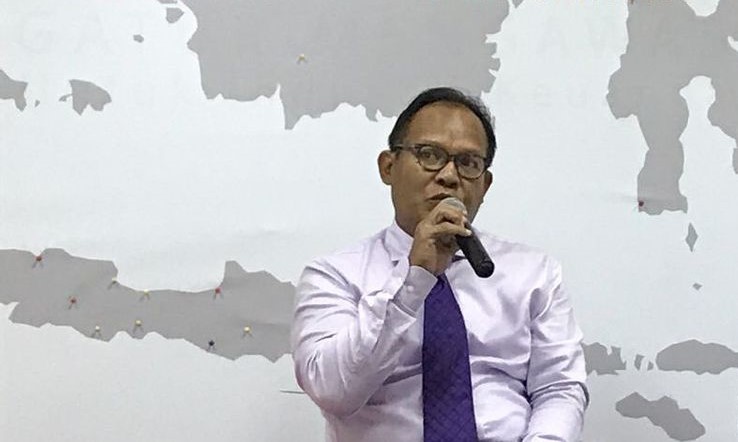
The Financial Services Authority (OJK) targets the contribution of Micro, Small and Medium Enterprises (MSMEs) to the Gross Domestic Product (GDP) to continue to increase every year.
OJK Deputy Commissioner Bambang W Budiawan said that his party is targeting next year the contribution of MSMEs to GDP to increase from 40 percent to 50 percent. At the end of 2025 or 2026 it will increase to 60 percent, and at the end of 2027 or 2028 it is expected to contribute up to 70 percent.
To achieve this, Bambang said, OJK will help provide easy access to financing. For this reason, OJK continues to encourage the growth of peer to peer (P2P) lending financial technology (fintech) companies.
Bambang explained, until July 2023 there were 102 P2P lending providers with 166.8 thousand active funders and 20.4 million active fund recipients.
The outstanding funding amounted to Rp55.98 trillion, while the accumulated funding was Rp657.85 trillion.
"Specifically, the outstanding funding channeled to MSMEs amounted to Rp21.58 trillion or 38.54 percent of the total outstanding industry," he said.
According to Bambang, the presence of P2P lending can be an alternative for MSMEs that are classified as not meeting the requirements to access banking services or underserved/unbankable.
In addition to P2P lending, OJK also encourages the development of fundraising methods with a business joint venture scheme by business owners or securities crowdfunding (SCF).
Bambang said that as of July 2023, there were 16 SCF providers who had obtained OJK licenses with 423 issuers and 156,632 investors. The total funds that have been raised amounted to Rp911.35 billion.
There are still many MSMEs that find it difficult to obtain capital
The Ministry of Finance (Kemenkeu) and OJK highlighted that there are still many MSMEs that have difficulty getting access to capital.
"There is a study that estimates that MSMEs in Indonesia that currently do not have access to financing reach 46.6 million MSMEs," said Head of the Financial Sector Policy Center (PKSK) of the Ministry of Finance's Fiscal Policy Agency, Adi Budiarso.
According to him, access to financing for MSMEs is a big challenge at the moment. Of the total credit that has been channeled by banks, only one-fifth has been given to MSMEs.
OJK also conveyed the same thing. Plt. Head of the Department of Supervision of Microfinance Institutions and Other Financial Services Institutions, OJ Andra Sabta, mentioned the results of Ernst Young (E&Y) Pantheon Indonesia research which estimates that MSME financing needs will reach Rp4,300 trillion by 2026.
As for the total need, the financing that might be accommodated only reaches Rp1,900 trillion. Thus, there is still a financing gap of more than Rp2,000 trillion.
What Causes MSMEs to Have Difficult Access to Capital?
OJK encourages the fintech sector to fill the financing gap, especially for MSMEs that have had difficulty obtaining credit from financial institutions such as banks.
Even so, there are still few MSMEs that can take advantage of capital through fintech or from banking institutions for several reasons, such as:
Lack of Financial Information
Secretary General of the Indonesian MSME Association (Akumindo) Eddy Misero revealed that a low level of literacy is one of the obstacles for MSMEs in gaining access to capital. This is because in terms of education, MSME players are at the middle to low level.
Lack of Digital Knowledge
Meanwhile, Executive Director of the MSME Community Forum (Fokus UMKM) Ari Prabowo said, of the more than 60 million MSME units in Indonesia, there are still few who can take advantage of capital due to the lack of knowledge about the digital world.
Not Passing the Audit
MSMEs that cannot meet audit requirements or have poor financial records may find it difficult to access capital. This is because poor audit results can reduce the level of trust of capital providers, be it banking institutions, P2P lenders, or investors.
Unsecured Assets
MSMEs that do not have valuable assets or collateral that can be used as loan collateral have a higher risk in the eyes of financial institutions and P2P lenders. This can make it difficult for them to get loans with good terms.
Lack of Business Legality
When a business does not have clear legality or the necessary business license, financial institutions such as banks, P2P lenders, and investors will certainly hesitate to provide capital loans. Business legality is important to ensure the legality of the loan contract.
To overcome this problem, MSMEs need to improve financial transparency, adopt technology for business management and P2P lending applications, and fulfill business legality.
By doing so, MSMEs will have easier access to capital. This will enable MSMEs to maximize their business potential, increase profits, plan business expansion, and in turn, make a more significant contribution to the country's GDP.
The importance of supporting MSMEs in overcoming such barriers also applies not only to economic growth, but also to job creation and the overall improvement of people's welfare.
Source : kontrakhukum.com



National Economy
Regional Economy
National Economy
Regional Economy